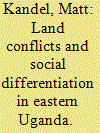|
|
|
Sort Order |
|
|
|
Items / Page
|
|
|
|
|
|
|
| Srl | Item |
| 1 |
ID:
155005


|
|
|
|
|
| Summary/Abstract |
Rising competition and conflict over land in rural sub-Saharan Africa continues to attract the attention of researchers. Recent work has especially focused on land governance, post-conflict restructuring of tenure relations, and large-scale land acquisitions. A less researched topic as of late, though one deserving of greater consideration, pertains to how social differentiation on the local-level shapes relations to land, and how these processes are rooted in specific historical developments. Drawing on fieldwork conducted in Teso sub-region of eastern Uganda, this paper analyses three specific land conflicts and situates them within a broad historical trajectory. I show how each dispute illuminates changes in class relations in Teso since the early 1990s. I argue that this current period of socioeconomic transformation, which includes the formation of a more clearly defined sub-regional middle class and elite, constitutes the most prominent period of social differentiation in Teso since the early 20th century.
|
|
|
|
|
|
|
|
|
|
|
|
|
|
|
|
| 2 |
ID:
159211


|
|
|
|
|
| Summary/Abstract |
While most researchers criticize the effectiveness of states in Africa, state formation is proceeding, albeit gradually. This article analyzes state formation along the historically conflict-affected and fragile Karamoja–Teso sub-national border in north-eastern Uganda. I argue that the central state has consolidated control over the north-east and begun the process of politically incorporating Karamoja into Uganda for the first time in history—evidence of state formation. Yet, this success has unintentionally created space for renewed conflict in two ways: (i) a territorial conflict between and within the Teso and Karamoja local states over the legitimate location of the sub-national border, and (ii) rising competition over the utilization of land along the now secure border. I emphasize that tensions surrounding the border are far from a recent development; they are deeply rooted in political, economic, and cultural processes that stretch back centuries. This article makes the argument for evaluating state formation in Africa over the longue durée. It also seeks to build on recent work which underlines the historically contingent and shifting dynamics that shape, enable, and constrain state making in Africa.
|
|
|
|
|
|
|
|
|
|
|
|
|
|
|
|
| 3 |
ID:
145177


|
|
|
|
|
| Summary/Abstract |
Land dispossession and conflicts over land compound resettlement efforts in post-conflict contexts. This is particularly true in rural sub-Saharan African countries, where the vast majority of livelihoods depend on maintaining access and rights to cultivable land. This article engages in the active debate on this topic using ethnographic research conducted in the Teso region in eastern Uganda during 2012 and 2013. The Teso region experienced three violent conflicts from the late 1960s to the mid-2000s, which at times were overlapping: large-scale cattle rustling, a civil war, and an insurgency. The research focuses on Amuria District, Katakwi District, and Tisai Island in Kumi District in order to consider three interrelated phenomena: the cyclical nature of the displacement-resettlement process, the intra-regional differences in how this process has unfolded, and the particular ways in which struggles over land are deeply embedded within the post-conflict context. The article argues that post-conflict rearrangements in property relations create complex challenges for resettling populations, and if left unaddressed will merely result in increasingly unstable land tenure regimes. It also argues that struggles over land in Teso should not be understood solely through a post-conflict lens, as there are a variety of drivers – some not tied directly to the violent conflicts – that interact with post-conflict dynamics to create a perfect storm for land tenure instability.
|
|
|
|
|
|
|
|
|
|
|
|
|
|
|
|
|
|
|
|
|